Celebrating cotton’s


Celebrating cotton’s







page 6
Georgia Co. wins national award
Consumers’ love of mushrooms helped a start-up company at Kennesaw State win the AFBF Ag Innovation People’s Choice Award.

Want to subscribe? Join Georgia Farm Bureau to receive GFB News four times a year. Membership means supporting farmers & agriculture while having access to more than 300,000 discounts. Visit gfb.ag/join.
pages 10 & 11
Spreading the message of cotton’s sustainability
Cotton is an environmentally friendly crop. Cotton organizations are working to make sure consumers know it.

pages 20 & 21
January tornadoes damage barns, kill livestock

Two Meriwether County farms were hit by the Jan. 12 storm along with the UGA Griffin Campus & a Henry County farm.
page 7
John Deere green-lights some equipment repairs
Farmers & independent mechanics can now repair John Deere equipment thanks to an agreement it reached with the American Farm Bureau.
pages 8 & 9
Peanut Rx can help lessen TSWV yield loss
Georgia peanut farmers can lessen yield loss to tomato spotted wilt virus & other diseases by using an online analysis tool to evaluate their planting practices.
page 4
View from the Field
page 5
page 24
Policy
YF&R Program
page 26
Women's Leadership Program
pages 28 & 29
Ga. Foundation for Agriculture
page 30
Ag in the Classroom
pages 12 & 13
County Farm Bureaus honored for outstanding work

page 14
Dowell wins GFB Hay contest
pages 16 & 17
Farmers hesitant to dive into carbon markets
pages 18 & 19
Top corn producers & peanut contributors honored
Kenny Burgamy Director
Jennifer Whittaker Editor
Jay Stone News Reporter
Jared McGukin Graphic Designer
Logan Thomas Photographer
page 22
Collectible pocketknife raises money for local FFA
page 25 page 27
YF&R competitors represent Georgia at AFBF
Women in Ag Summit offers encouragement
page 31
GFB Ambassadors promote membership
FOLLOW US ON THESE PLATFORMS @GAFARMBUREAU
On The Cover:
Photo by Logan Thomas
March is National Peanut Month! UGA research helps farmers grow a healthy crop.
For information concerning advertising, contact Wendy McFarland at 334-6529080 or mcfarlandadvantage@gmail.com. For questions about your membership or member benefits, call 1-800-633-5432. For questions regarding editorial content call 478-474-0679, ext. 5334 or e-mail jawhittaker@gfb.org.
Warmer weather is at our doorsteps, and it is time to get back to the outdoors and do some of the things we love best; plant, grow, and harvest.
Before too much more of the year passes, I wanted to reflect on some good news.
First, our family enjoyed a wonderful Christmas season, and I trust you all did, too.
Jane and I welcomed our first granddaughter, McCall, last October and that made spending time with our family even more meaningful.

In January, it made me proud at the annual American Farm Bureau (AFBF) Convention in San Juan when it was announced that John Deere had agreed to a memorandum of understanding (MOU) regarding Right to Repair.
All of us saw first-hand how valuable it is to have a strong membership base representing Georgia Farm Bureau (GFB) and an accomplished staff that helped shape the discussions between John Deere and AFBF.
Georgia farmers can join producers, equipment owners and independent mechanics around the country in celebrating this news announced by AFBF President Zippy Duvall and John Deere Sr. VP of Ag & Turf Sales & Marketing David Gilmore.
For several years, it was my honor to serve on the advisory board that gave input on the MOU. It has been our priority to secure right-to-repair access for farmers.
Members of our GFB public policy team spent many hours working with folks at AFBF in D.C. to make certain this had a positive outcome.
A major component in the agreement is that it is a working document. This means it can be adjusted situationally to help meet the needs and assist producers as they arise.
This MOU has the potential to serve as the model for other companies and I know AFBF has already started those conversations. I’m hoping other manufacturers will follow suit and join us in helping farmers supply food and fiber to Georgia and the world.
I encourage you to read the entire MOU online by visiting: https://gfb.ag/afbfjdmou.
Thank you for allowing us to serve you all.
Tom McCall, GFB PresidentOFFICERS President
TOM McCALL, Elbert Co.
1st Vice President & South Georgia Vice President
DANIEL JOHNSON, Pierce Co. North Georgia Vice President
BERNARD SIMS, Catoosa Co.
Middle Georgia Vice President
RALPH CALDWELL, Heard County General Counsel
DUKE GROOVER
Chief Financial Officer, Corp. Treasurer & GFBMIC Exec. VP
DAVID JOLLEY
Chief Administrative Officer
JEFFREY HARVEY
Corporate Secretary & Senior Counsel
JEANNA FENNELL
Asst. Corp. Treasurer & Sr. Director of Accounting

RACHEL MOSELY
FIRST DISTRICT: Bill Bryan, Chattooga Co.; Wesley Hall, Forsyth Co. SECOND DISTRICT: Gilbert Barrett, Habersham Co.; Russ Moon, Madison Co.THIRD DISTRICT: Nora Goodman, Paulding Co.; Brad Marks, Newton Co. FOURTH
DISTRICT: Skeetter McCorkle, McDuffie Co.; Russ Wilburn, Barrow Co. FIFTH DISTRICT: Matt Bottoms, Pike Co.; Leighton Cooley, Crawford Co. SIXTH DISTRICT: James Malone, Laurens Co.; James Emory Tate, Jeff Davis Co. SEVENTH
DISTRICT: Gary Bell, Evans Co.; Ben Boyd, Screven Co. EIGHTH DISTRICT: Scotty Raines, Turner Co.; Don Wood, Wilcox Co. NINTH
DISTRICT: Lucius Adkins, Baker Co.; Paul Shirah, Mitchell Co. TENTH DISTRICT: David Lee, Bacon Co.; Lamar Vickers, Berrien Co. YOUNG
FARMERS & RANCHERS CHAIR: Colt Hart, Franklin Co.
WOMEN’S LEADERSHIP CHAIR: Kathy Sanders, Laurens Co.
All advertising accepted subject to publisher’s approval. Advertisers must assume liability for content of their advertising. Publisher maintains right to cancel advertising for non-payment or reader complaint about advertiser service or products. Publisher does not accept per-order, political or alcoholic beverage ads, nor does publisher prescreen or guarantee advertiser service or products. Publisher assumes no liability for products or services advertised in the Georgia Farm Bureau News. For advertising rates and information, contact Wendy McFarland at 334-652-9080 or mcfarlandadvantage@gmail.com. Georgia Farm Bureau News was established in 1937. Copyright 2023 by the Georgia Farm Bureau Federation. Printed by Panaprint, Macon, Georgia.
On Jan. 9, legislators filled the Georgia Capitol signaling the beginning of the 2023 General Assembly. This year marks the start of a two-year session along with the introduction of a large freshman class of legislators. Georgia Farm Bureau (GFB) is excited to be back under the gold dome with old friends and new faces as we continue to represent our members and advocate for Georgia agriculture
There are 53 new members of the General Assembly. New leadership in the Georgia House and Senate accompanies this extensive turnover in members. In the House, Rep. Jon Burns from Newington, Dist. 159, replaces the late David Ralston as House Speaker. Newly elected Lt. Gov. Burt Jones is leading the Senate along with President Pro Tempore Sen. John Kennedy, Bolingbroke, Dist. 18. Sen. Russ Goodman, from Homerville, Dist. 8, is chairing Georgia’s Senate Agriculture & Consumer Affairs Committee after Sen. Larry Walker III was named chairman of the Senate Insurance & Labor Committee. Chairman Goodman, a seventh-generation farmer from South Georgia, is passionate about representing agriculture.
We are excited to welcome back Rep. Robert Dickey, Musella, Dist. 145, as chairman of the House Agriculture & Consumer Affairs Committee. Chairman Dickey is a friend of GFB, and we know he will continue to be a leader for agriculture in the House.
Georgia agriculture is fortunate to have committee leaders in both chambers who are farmers with extensive agriculture backgrounds. We welcome Gov. Brian Kemp back to the Capitol as he begins his second term. Kemp has shared his ambitions to continue economic growth in Georgia and believes continuing to invest in agriculture is essential for job growth across other sectors.
At the Georgia Department of Agriculture, we welcome newly elected Agriculture Commissioner Tyler Harper. A seventh-generation farmer from Irwin County, who formerly chaired the Senate Natural Resources Committee, Commissioner Harper is a friendly face to many in Atlanta. We know he will continue to do great work for agriculture as our new commissioner.
Sen. Lee Anderson of Grovetown, Dist. 24, is replacing Harper as chairman of the Senate Natural Resources Committee. Anderson is a long-time GFB member and good friend.





During the past election cycle, the GFB Impact Fund, GFB’s political action committee (PAC), saw great success. The Impact Fund endorsed 135 candidates in the general election, and we were happy to see them all get elected.
The PAC is vital for GFB’s continued success at the Capitol. It is important we support the candidacies and election of qualified individuals to public office who have demonstrated a commitment to furthering and strengthening the agricultural industry, regardless of political affiliation.

Georgia Farm Bureau member Dr. Chris Cornelison and his colleagues at MycoLogic LLC won the People’s Choice Award in the Agriculture Innovation Challenge during the annual American Farm Bureau convention in January.
MycoLogic co-founders Cornelison and Dr. Kyle Gabriel have developed technology to help farmers more efficiently grow specialty mushrooms - like Shiitake, Oyster and Lion’s Mane – in larger quantities and of better quality. The company’s proprietary software can be used in 40-foot shipping containers or existing infrastructure.
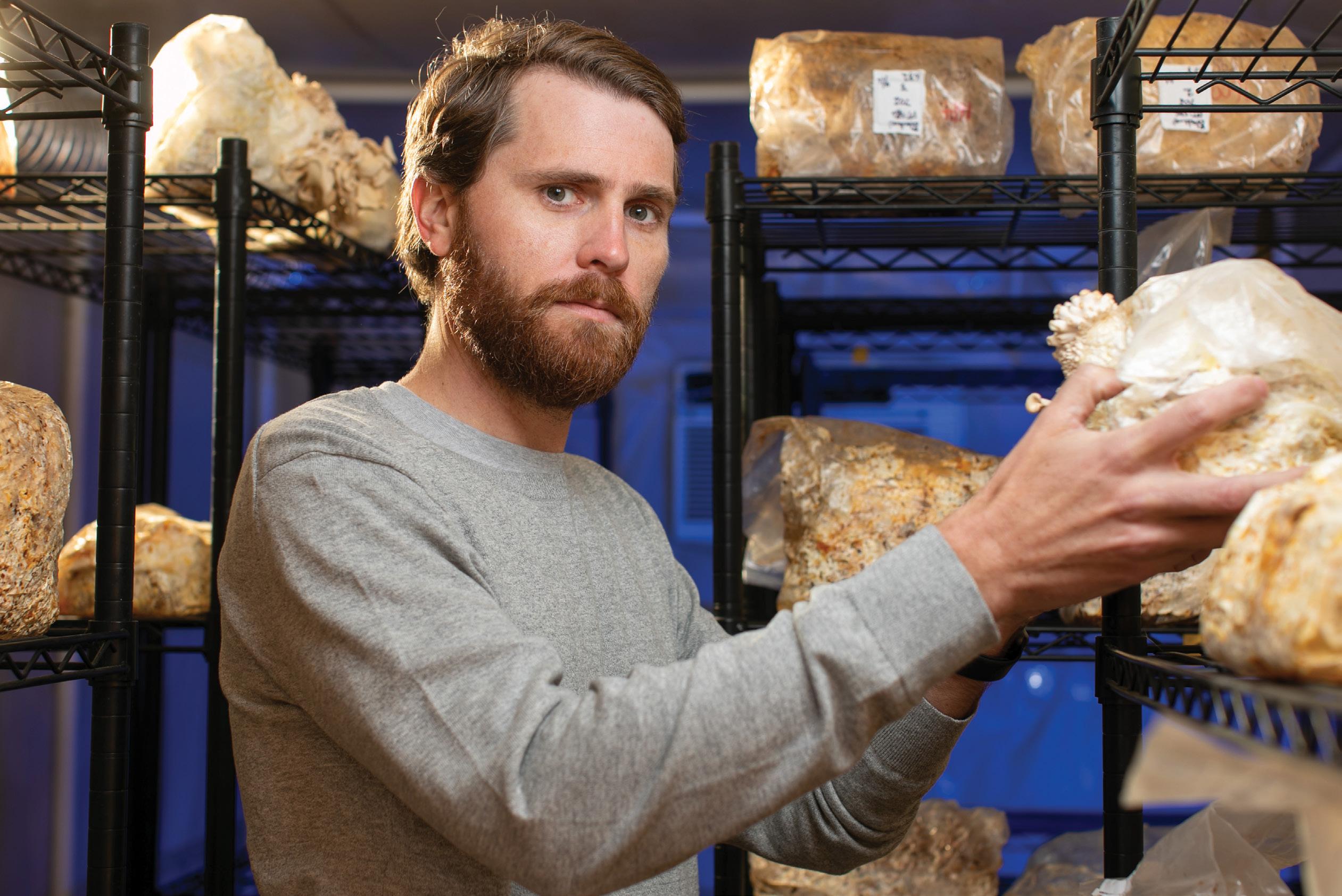
The startup, which originated in the BioInnovation Laboratory at Kennesaw State University, received a $5,000 prize for being voted the People's Choice Award. This award resulted from receiving the most votes in an online poll featuring the Top 10 ag-based startup companies in the contest. MycoLogic received $10,000 as one of nine semi-finalists in the contest and $5,000 for being a final four competitor.
Cornelison says this technology increases the profitability of existing farms and helps new growers enter the market by providing a ready-to-use solution for increasing the size and frequency of harvests while reducing labor costs.
“The sales of specialty mushrooms have increased by 50% in the past five years and most of the specialty mushrooms consumed in the U.S. are grown overseas,” Cornelison said. “Our software can help people successfully grow mushrooms anywhere in the U.S.,”
Luc Lalire is responsible for MycoLogic’s business development. Will Beeson manages mushroom cultivation and operations.
By Jennifer WhittakerThe Ag Innovation Challenge, organized by AFBF and sponsored by Farm Credit, gives individuals a chance to showcase their ideas and business innovations in agriculture. This is the ninth year of the challenge, which focuses on entrepreneurs launching food and agriculture businesses that will help farmers or rural residents. Bayer Crop Science, John Deere, Farm Bureau Bank and Farm Bureau Financial Services also support the contest.
In the final four round of the competition, MycoLogic competed against teams from Iowa - Chop Local - an online store that facilitates direct sales of meat between producers or local butchers and consumers; Texas - EmGenisys Inc. - a company that developed software to help beef and dairy producers evaluate the health/viability of embryos before implanting into brood cows to increase calving success and genetics goals; and KansasNORDEF - a company that developed technology and machinery to allow farmers/large equipment operators to mix diesel exhaust fluid (DEF) onsite in the quantity that they need by using a pod of urea and mixing it with water.
NORDEF won the competion to receive a total of $50,000 in prize money. EmGenisys Inc. was named runner-up in the contest and received a total of $20,000.
Applications are being accepted for the 2024 Ag Innovation Challenge until May 12. Learn more at www.fb.org/challenge.
Farmers and independent mechanics can now repair John Deere equipment thanks to a memorandum of understanding (MOU) the American Farm Bureau Federation (AFBF) and John Deere reached. The agreement comes after several years of discussions.
AFBF President Zippy Duvall and David Gilmore, John Deere Senior Vice President of Ag & Turf Sales & Marketing, signed the MOU Jan. 8 at the AFBF Convention in San Juan, Puerto Rico.

“AFBF is pleased to announce this agreement with John Deere. It addresses a long-running issue for farmers and ranchers when it comes to accessing tools, information and resources, while protecting John Deere’s intellectual property rights and ensuring equipment safety,” Duvall said. “A piece of equipment is a major investment. Farmers must have the freedom to choose where equipment is repaired, or to repair it themselves, to help control costs. The MOU commits John Deere to ensuring farmers and independent repair facilities have access to many of the tools and software needed to grow the food, fuel and fiber America’s families rely on.”
Securing right-to-repair access for farmers has been a priority issue for Georgia Farm Bureau for several years.
GFB President Tom McCall is one of four state Farm Bureau presidents who serves on the advisory board giving input on the MOU. State Farm Bureau presidents from California, Delaware, and Nebraska are also advisors.
“This Memo of Understanding is a working document that will help farmers using John Deere equipment expedite repairs
on their important investments. I am extremely proud of the work the Georgia Farm Bureau Public Policy team did to help get this document executed. Our staff spent many hours working with folks at AFBF in D.C. to make certain this had a positive outcome,” McCall said.
John Deere commits to engaging with farmers and dealers to resolve issues when they arise and to meet with AFBF at least twice per year to evaluate progress.
“This agreement reaffirms the longstanding commitment Deere has made to ensure our customers have the diagnostic tools and information they need to make many repairs to their machines,” said Gilmore.
The agreement formalizes farmers’ access to diagnostic and repair codes, operator, parts and service manuals, and product guides. It also ensures farmers will be able to purchase diagnostic tools directly from John Deere and receive assistance from the manufacturer when ordering parts and products.
AFBF has begun discussions with other manufacturers to reach similar MOUs.
Legislation regarding right-to-repair issues is pending in several states, but Farm Bureau leaders say the organization preferred to find a solution within the industry to have one set of guidelines for equipment owners nationwide rather than a patchwork set of laws that vary by state.
To read the MOU visit https://gfb.ag/afbfjdmou.
Use the Peanut RX analysis tool. That’s the advice the doctors on the UGA Peanut Team recommend as Georgia peanut producers prepare to plant their 2023 crop.
This stems from about 7% of Georgia’s 2022 peanut yield being lost to tomato spotted wilt virus (TSWV). This loss equals what the virus cost growers in 2019 and 2005, the largest since TSWV caused a 12% yield loss in 1997.
“I’ve been dealing with tomato spotted wilt virus for 33 years. Some things last year took me back to 1997 when we saw some of the worst spotted wilt virus,” UGA Plant Pathologist Dr. Albert Culbreath said.
According to the USDA National Agricultural Statistics Service, Georgia’s 2022 peanut crop had an average yield of 4,250 lbs/acre compared to 2021’s 4,450 lbs/acre.
The quality of Georgia’s 2022 peanut crop was good, Dr. Scott Monfort says, with 99.8% of the crop being graded Seg 1- the top score the USDA gives. Total sound mature kernels (TSMK), however, were lower for the 2022 crop at 73.8% versus the 2021 crop’s 75.8%.
“Production and grades don’t show losses by our top growers,” Monfort said. “For our early planted crop, irrigated peanuts were down 1,000 or more pounds an acre and grades were off for TSMK.”
Georgia’s dryland peanut acres had above average yields in most parts of the state, Monfort said, which helped make up for TSWV yield loss some growers had.
Researchers at the Universities of Georgia and Florida, Auburn University, Mississippi State and Clemson collaborated to create an online tool farmers can use to assess their risk for major peanut diseases based on production practices.
Growers enter their variety planted, planting date, plant population, insecticide/herbicide use, row pattern, tillage method, crop rotation, field disease history and irrigation. The tool includes chemical management plans for eight major companies so growers can see how using products at the recommended times and amounts affects disease incidence. Points are assigned to each production choice. The risk index gives producers a low, moderate or high-risk assessment for TSWV, leaf spot and white mold based on the number of points they accumulate. The tool is updated as needed each year to reflect new research findings.
TSWV can cause a disease that severely weakens or kills a plant. The virus is transmitted by tiny insects called thrips that pierce and suck plants, but thrips only transmit TSWV if they acquire the virus as larva.
Thrips can cause mild to significant plant damage on their own, but their transmission of TSWV is what makes controlling them a priority for peanut growers.

TSWV became a significant disease for Georgia farmers in the 1990s and can also affect pepper, tomato and tobacco crops.
Tobacco thrips and western flower thrips are the two species that transmit TSWV in peanuts, UGA Peanut Entomologist Mark Abney says. Many plants serve as hosts for tobacco thrips and the insects overwinter on cold weather plants.
“Right now, they’re in your winter weeds and in your winter wheat,” Abney said.
Thrips can move to your farm from the field next door or travel long distances, Abney says.

Weather determines the number of thrips there are in spring, Abney says. He notes warm winter weather generally means more thrips. Winter rain usually means fewer.
“Immature thrips are killed by rain – especially in February and March. If we have a warm winter and it’s dry, we’ll have higher thrips populations,” Abney said. “The best scenario is a cold and wet winter.”
Dr. Bob Kemerait points out that sustained cold temperatures are needed to lower thrips numbers.
“We had cold weather at Christmas and the second weekend of January, but I’m most interested in what type of weather we have from mid-January to April,” Kemerait said.
Thrips complete their life cycles in two to three weeks.
“The warmer it is, the faster their life cycle goes,” Abney said.
UGA research shows that every 1% of TSWV infection in the GA-06 Green variety causes a 20 lb/acre yield loss.
UGA Peanut Team researchers acknowledge some growers who don’t follow the Peanut Rx recommendations have little TSWV.
“Sometimes you get lucky,” Kemerait said.
For growers who have followed the Peanut RX system yet still had TSWV in their fields, Kemerait reminds them, “Following Peanut RX is no promise that you won’t have some TSWV in your crop, but it will help you remain profitable.”
“Peanut RX is not just doing one thing. It’s following all the recommendations,” UGA Plant Pathologist Dr. Bob Kemerait said.
Kemerait says the production decisions growers make about planting their crop determine how the crop will fare against TSWV.
“Once the furrow is closed, you’ve done everything you can do to manage tomato spotted wilt,” Kemerait said. “When you drive away from the field the die is cast .”
Recommendations peanut specialists encourage to decrease TSWV incidence include, in order of impact:
1 Plant peanuts after May 10 if possible
2 Apply phorate in-furrow when planting
3 Plant using no-till or strip-till
4 Plant a variety that has shown some resistance
Growers can visit www.peanutrx.org to use Peanut RX on their computers or download the app via the Apple App Store or at Google Play.
Making a good cotton crop is one thing. Doing it in a way that benefits the environment is next level. Officials with state and national cotton organizations say this is what Georgia’s cotton growers are doing.
Telling the story of cotton’s sustainability was a major theme of the Georgia Cotton Commission (GCC) Annual Meeting held Jan. 25. General session speakers praised growers for their work and shared opportunities available for farmers who continue to pursue environmental benefits.
“We’re trying to tell our industry’s story,” said GCC Executive Director Taylor Sills, who pointed out a variety of initiatives the organization is using toward that goal.
One key storytelling vehicle is the U.S. Cotton Trust Protocol (USCTP), which combines growers’ investments in sustainable practices with a marketing campaign highlighting those practices to consumers interested in buying sustainable products. Among U.S. consumers, 58% say sustainability influences their purchases of clothing, according to Consumer Confidence Index data and a 2021 Cotton Inc. survey. This is up 12% from 2017 when 46% of U.S. consumers wanted clothes produced by sustainable methods.
USCTP continues to seek new growers to enroll and could offer participating farms significant financial compensation through the U.S. Climate Smart Cotton Program. The USDA awarded USCTP a grant in September to provide technical and financial assistance to more than 1,000 cotton farmers to adopt climate smart practices on more than 1 million acres. The program is
By Jay Stoneexpected to result in more than 4 million bales of Climate Smart Cotton over five years.
Growers have until March 31 to enroll in the USCTP program. Visit TrustUSCotton.org to learn more.

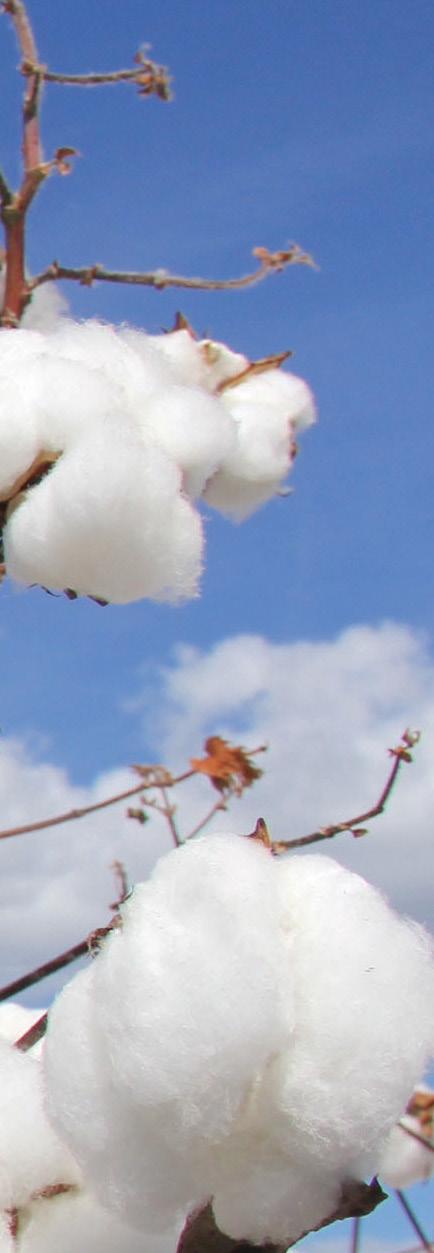
Cotton Inc. Vice President for Agricultural and Environmental Research Dr. Ryan Kurtz provided updates on the research organization’s work, noting that cotton growers are checking many key sustainability boxes. Kurtz pointed out that over the past 40 years, the cotton sector has reduced land use by 30%, cut soil loss by 45%, reduced water consumption by 58%, trimmed energy use by 31% and reduced greenhouse gas emissions by 25%.
Kurtz also addressed the need for economic sustainability. “We’ve made significant improvements in all these areas. It’s through your efforts and the efforts of the research and Extension community that made this happen,” Kurtz said. “We’re trying to build on this, continue to make progress in these areas, make changes. We’ve set a series of 10-year goals to make continual improvement on the strides that you’ve already made. We’re not doing sustainability (just) for sustainability’s sake. We’re doing it to make you more profitable and your cotton more marketable.”
Kurtz said that moving forward, Cotton Inc.’s research would be addressing current problems as they arise, keeping focus on yield and quality, looking for ways to improve input efficiency and validating emerging technologies.
Strategic studies will center on pest management, cottonseed quality, sustainability support, emerging technology, and genomics.
Kurtz said Cotton Inc. is also funding research focused on determining how cottonseed oil compares with olive oil as a component of the human diet.
“We want to use these results in marketing to see if we can increase demand for cottonseed oil,” he said.
“Almost all the data we’ve produced to date has been very positive or neutral. We feel like it’s a good spot to be in. Hopefully we can increase the prevalence of cottonseed oil and get it more into diets and help market it in a different way and add value.”
National Cotton Council Vice President for Producer Affairs Tas Smith discussed factors affecting crop insurance decisions facing growers. He also reviewed federal appropriations for cottonrelated projects.
Smith said that for the 2022/2023 marketing year, the NCC encouraged producers to consider the Stacked Income Protection Plan (STAX) because of the programs' projected cotton prices at or around $1 a pound. Growers could see payments of $20-$40 per acre for their 2022 crop under STAX, Smith said.
“Payment under PLC is very unlikely in the 2022/23 crop year,” he said, noting that marketing year average prices reported by the National Agricultural Statistics Service (NASS) would have to fall below 74 cents per pound before PLC payments would be triggered. Current prices are in the mid-80s-cents per pound range.
Smith covered growers’ alternatives under the cottonseed provisions in the Agricultural Risk Coverage (ARC) and Price Loss Coverage (PLC) crop insurance programs for the 2023/24 marketing year
“It’s not a clearcut decision right now. It could change if the average price goes up a couple of cents,” Smith said. “I would just tell you to look at each farm individually.”
Smith also reviewed funding provisions under FY2023 federal appropriations, which include $15.45 million for the Boll Weevil Eradication Program, up from $14.725 million, $4 million to upgrade the USDA’s Agricultural Marketing Service cotton classing labs, $2.35 million in new funding to expand cotton genetics and fiber quality research, $3.75 billion for 2022 crop losses and $100 million to help cotton merchandisers with COVID-related supply chain losses.




During its 2022 annual convention in December, Georgia Farm Bureau (GFB) recognized county Farm Bureau chapters that excelled in their member programs and ag advocacy activities last year. GFB’s new Rewarding Excellence in Ag Programs (REAP) award, offers three tiers of recognition – cultivator, planter and harvester, for each of the organization’s membership categories (small, medium and large). Harvester is the top tier of recognition.
Counties receiving the REAP Cultivator Award were: small membership category- Crisp, Marion, Meriwether, Putnam & Warren; medium membership category- Decatur, Dougherty, Toombs, Troup & Wayne; large membership category- South Fulton, Henry, Madison, Paulding & Stephens.
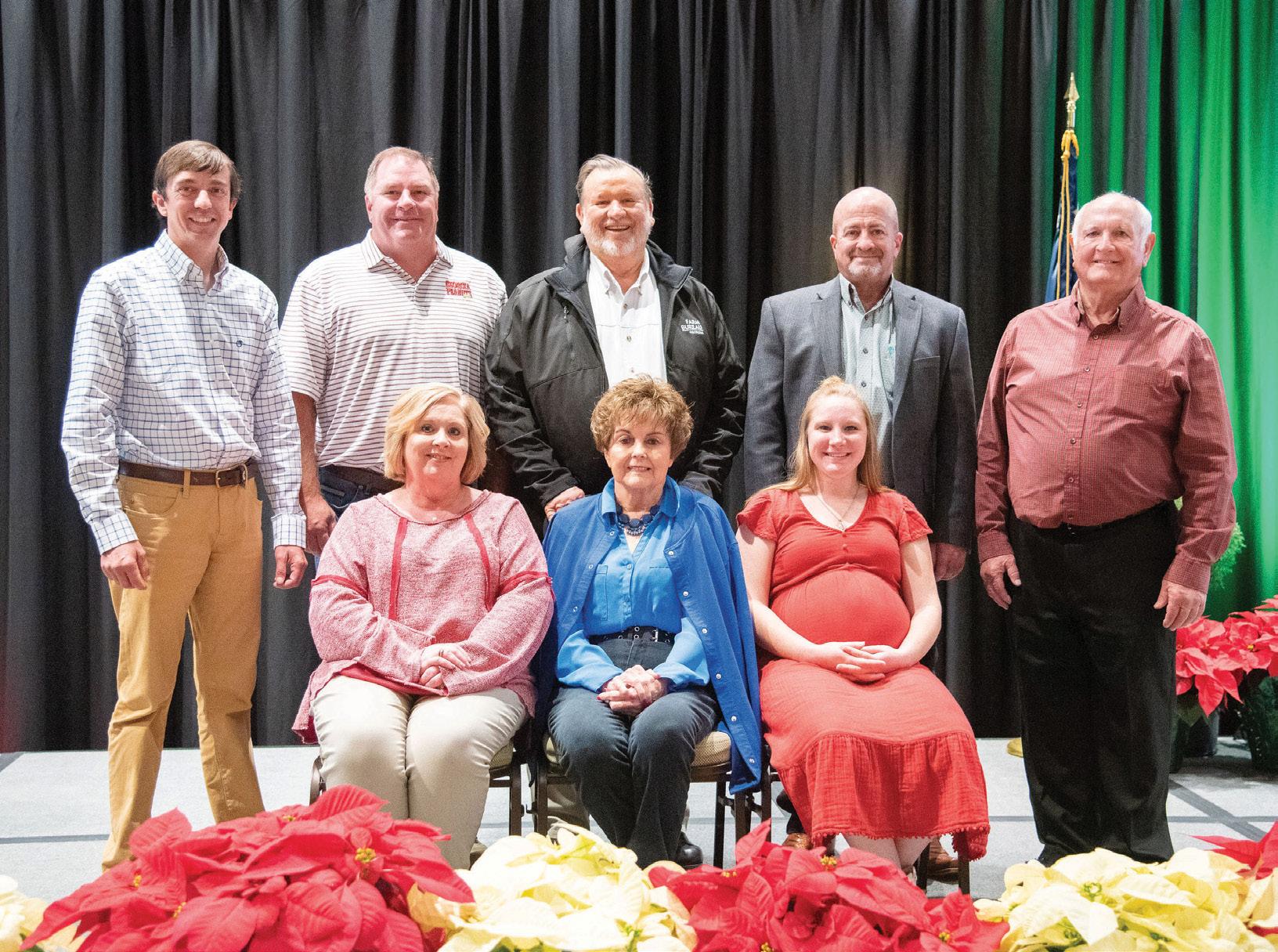
Counties receiving the REAP Planter Award were: small membership category- Clinch, Dooly, Long, Treutlen & Upson; medium membership category- Clarke, Dawson, Greene, Pike & Polk; large membership category- Banks, Barrow, Carroll,
County Farm Bureaus receiving the REAP Harvester Award in GFB’s small membership category were Bacon, Crawford, Macon, Turner & Worth. County office managers accepting the awards were: seated from left, Karen McCurdy, Turner; Jeanne Taylor, Bacon & Stephanie Harris, Crawford. Not pictured Connie Melton, Worth. County presidents accepting the awards were: standing from left, Matt Oliver, Macon; Ross Kendrick, Turner; David Lee, Bacon; Edd Harris, Crawford; &

County Farm Bureaus receiving the REAP Harvester Award in GFB’s medium membership category were Berrien, Harris, Jeff Davis, Monroe & Screven. County Office managers accepting the awards were: seated from left, Beth Reddick, Screven; Sandi Williams, Monroe; Regina Barton, Jeff Davis; & Vanna Boykin, Berrien. Not pictured Linda Luttrell, Harris. County presidents accepting the awards were: standing from left, Joe Boddiford, Screven; Clete Sanders, Monroe; James Emory Tate, Jeff Davis; Linwood Rowan, Berrien; & Gilbert Andrews,






County Farm Bureaus receiving the REAP Harvester Award in GFB’s large membership category were Cherokee, Coffee, Effingham, McDuffie & Walker. County Office managers accepting the awards were: seated from left, Carla Palmer, Coffee; Kim Cora Kay, McDuffie; Theresa Pevey, Effingham; & Shirley Pahl, Cherokee. Not pictured Kyla Compton, Walker. County presidents accepting the awards were: standing from left, Mike Bunn, Walker; Derek Pridgen, Coffee; Sammy McCorkle, McDuffie; Stuart Exley, Effingham; & William Grizzle,

Bartow County Farm Bureau member Franklin Dowell won the 2022 Georgia Farm Bureau Quality Bermudagrass Hay Contest. As the top winner in the hay contest, Dowell receives a year’s use of a Vermeer 604R baler, with the option to purchase it at a reduced price at the end of the year.
The contest, which drew 30 entries, has been held by the GFB Hay Commodity Committee since 1992 to encourage superior Bermudagrass hay production. Vermeer has provided the first-place prize since 1999.
Hay samples entered in the contest are analyzed using the University of Georgia’s Relative Forage Quality (RFQ) testing method, which measures nutrient content and digestibility of the hay.
RFQ for Bermudagrass hay in Georgia typically ranges from 75-120 or higher. Dowell’s sample of Jiggs Bermuda had an RFQ score of 155. The average RFQ score for all entries was 119.
For more about the lab and how the hay is tested visit www.gfb.ag/ugahaylab. Entered samples are required to have nitrate levels below 4,500 parts per million and moisture content of 18% or less to be eligible for contest prizes.
Jeff Bacon of Laurens County took second place for his Coastal Bermuda with an RFQ of 147 to win $200 and a soil probe. Guerry Hall of Franklin County came in third place with Coastal Bermuda that had an RFQ of 144 and won $100. Eddy Turner of Washington County placed fourth with Tift 44 that had an RFQ of 143 to win $100. Floyd Knowles of Telfair County placed fifth with Coast Cross hay that had an RFQ of 142 to win $100. GFB provided the runner-up prizes.
The winners were announced during the GFB Convention on Jekyll Island in December. Look for details about the 2023 hay contest to be announced this summer at www.gfb.ag/hay. If you are a GFB member with hay to sell or a farmer looking for hay, visit www.gfb.ag/hay.

Adam Belflower has joined the Georgia Farm Bureau Public Policy Department as a governmental affairs specialist.

He is a graduate of the University of Georgia College of Agricultural & Environmental Sciences. While at UGA, he studied agribusiness and researched food policy under Dr. Travis Smith in the CAES Department of Agriculture & Applied Economics.

“We are excited to have Adam join the Farm Bureau family. His strong academic background and agricultural ties make him a valuable addition to our advocacy efforts at the capitol and our members,” GFB President Tom McCall said.
Belflower was an active member of the GFB Young Farmers and Ranchers UGA Chapter competing in the discussion meet for two years, attending the GFB YF&R Conference, and attending the 2022 AFBF Convention


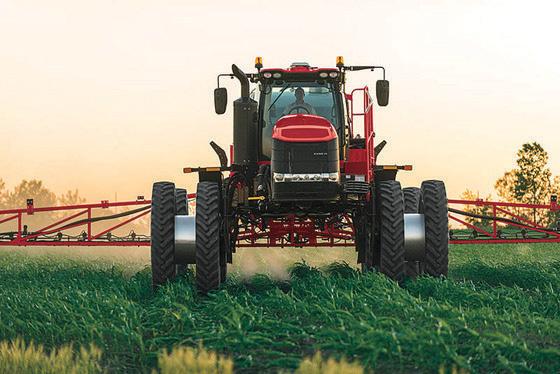

Belflower has worked as an intern for Corteva Agriscience on its Southeast seed team and as a licensing intern at the Georgia Department of Agriculture. He spent three summers as a row crop scout for a local agriculture consultant in Middle Georgia and worked on various farms with strawberries, row crops and livestock.
Belflower grew up in Cochran and attended Bleckley County High School. In middle and high school, he was a 4-H member with his project work focusing on strawberry production.
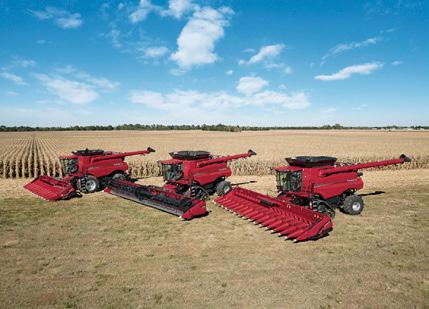

There is a strong case that agricultural soil is a viable tool for storing, or sequestering, carbon. It can be done. But it seems farmers aren’t sold on the idea of entering carbon markets to generate income.
A pair of Purdue University professors, Dr. Shalamar Armstrong and Dr. Nathanael Thompson, presented information via video on field crops’ relationship with U.S. carbon markets during the 2023 UGA Corn Short Course, held Jan. 17 in Tifton.
Armstrong, an associate professor in the Purdue Department of Agronomy, reviewed how carbon sequestration works and offered research showing the potential carbon storage yield in the United States.
There are three primary components in the short-term global carbon cycle: Pools, which have the capacity to store, accumulate or release carbon; Sinks, which absorb more carbon from the atmosphere than they release; and Sources, which are natural or artificial producers of carbon or carbon-based compounds.
Soils are one of the main pools, and when farmers use reduced tillage or double-cropping, soils can also be sinks, Armstrong said. Reducing tillage leaves carbon in the soil, but tillage disturbs the soil, prompting microbial organisms to metabolize carbon in the soil and release carbon dioxide into the atmosphere.
Carbon is captured through photosynthesis, so increasing the time plants are photosynthesizing increases the amount of carbon captured.
“If you’re growing corn and then you come back and you grow rye behind it, you’ve just moved from a single-cropping carbon system to a double-cropping carbon system,” Armstrong said. “Two different crops, two different plants, two different sets of roots in the ground, multiple periods of time, causes greater photosynthetic capture of carbon. Then the potential increase in soil organic carbon, the conversion from those plants into some semipermanent pool of carbon, that generates what we call a carbon credit.”

Nationally, U.S. agriculture has the potential to store as much as 187 million tons of carbon, Armstrong’s research shows. Carbon credits can be bought and sold. A company can buy a carbon credit from the government, allowing that company to generate defined quantities of carbon dioxide gasses. Or, the company can buy carbon offsets from other non-governmental entities. A farmer who is generating carbon credits can sell them as offsets to an entity looking to reduce its carbon footprint.
Thompson, an associate professor of agricultural economics at Purdue, said farmers have been slow to enter the carbon markets. He cited data from the Purdue University/CME Group Ag Economy Barometer, a survey of 400 farmers about their sentiments regarding the farm economy.
Thompson noted the survey pool is generally representative of U.S. agriculture, and it shows that between February 2021 and August 2022, less than 9% of respondents had discussions with companies about receiving payments for capturing carbon. Less than 1.5% entered into contracts to sell their carbon as offsets.
“These markets are in their infancy,” Thompson said. “There are a lot of unknowns, a lot of details that need to be figured out.”
In large part, farmers have been slow to enter the carbon market because the money being offered falls short of offsetting the cost of adopting carboncapturing practices. Current prices, Thompson said, range between $10 and $20 per metric ton (2,205 pounds).
The cost to convert from conventional tillage to conservation tillage is about $40 per acre. Thompson said if a farmer is capturing 0.5 metric tons per acre, that farmer would have to sell at a price of $80 per acre to cover the cost of conversion.



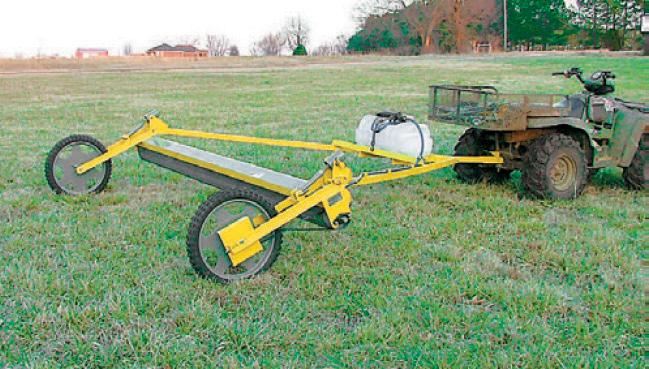
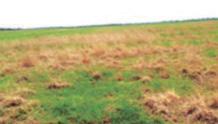

“It all relates to economics in terms of cost vs. benefits,” Thompson said. “There’s quite a bit of work left to be done on the price side.”


Congratulations to the 2022 UGA Extension Georgia Corn Yield Contest winners named at the Georgia Corn Short Course in January. From left are, James Hitchcock, Washington County (1st place irrigated strip till with 319 bu/acre & 2nd place conventional tillage irrigated with 318.2 bu/acre), Wallace Anderson, Gilmer County (1st place dry land, conventional tillage with 273 bu/acre), Jonathan Hitchcock, Washington County (1st place conventional tillage irrigated with 324.7 bu/acre & 1st place no-till irrigated with 319 bu/acre & 2nd place strip till irrigated with 312 bu/acre) and Ben Jackson, Johnson County (3rd place in strip till irrigated with 302 bu/acre). Not pictured are no-till irrigated 2nd place winner Steven Wischmeier, Bleckley County with 306.5 bu/acre) and 3rd place winner Mark Ariail, Franklin County with 244 bu/acre.

During the 46th Annual Georgia Peanut Farm Show & Conference, the Georgia Peanut Commission honored individuals and teams for advancing Georgia’s peanut sector. Front row, from left, GPC Chairman Joe Boddiford congratulates Sonny Perdue for being inducted into the Georgia Peanut Hall of Fame; Gary Black, GPC Distinguished Service Award and Bob Parker, GPC Promotion Award; back row from left are recipients Dr. Darlene Cowart, GPC Special Award for work on peanut quality/nutritional benefits; UGA Peanut Team leader Dr. Scott Monfort on behalf of the team, GPC Research & Education Award; Tyron Spearman, GPC Media Award; Calvin Perry, GPC Research & Education Award, for irrigation efficiency work; & Adam Curles, 2023 Outstanding Young Peanut Farmer. Not pictured is Dr. William D. Branch, recipient of the Innovator Award for developing numerous peanut varieties.

Jennifer
l
l
l
l 25% discount on all Jabra audio products.


 By Jay Stone
By Jay Stone
Jeff and Jana Busciglio found themselves scrambling for safety as a tornado roared through Meriwether County on Jan. 12. In a matter of minutes, the winds blew a portion of roofing off the dairy farm’s feed barn and downed numerous trees, some pinning cows to the ground.

The EF-2 twister that hit the Busciglio farm was one of 10 tornadoes confirmed by the National Weather Service in Georgia, part of a series of thunderstorms that produced numerous tornadoes across the South, leaving at least nine people dead and a wide swath of damage to homes, businesses and property, including farms.

The Busciglios moved their dairy operation in 2017 from Hillsborough County, Florida, to its current location near Gay. Ultimately, the tornado cost them 11 cows from their herd of 140 milking cows, and they had to repair or replace about 1,000 feet of field fence and another 200 feet of barbed wire.
“We were really, really, extremely blessed that we didn’t get torn up any more than we did, compared to what other people went through,” Jeff said.
Jana had come home to prepare supper, knowing the coming storm likely meant a subsequent power outage. She’d just put chicken in her pressure cooker when winds started battering the back of the family’s home. She moved the couple’s children to the basement, peeking upstairs to get a sense for damage as it occurred.
“I was like ‘Oh, this is not good. This is not just a storm. This is not OK,’” Jana said. “It was beating really hard. The wind picked up, and I couldn’t see anything because it was like white outside.”

Jeff, meanwhile, was on an ATV between the barn and the house. He was closer to the farm shop than the house, so he went there, but when he got inside, the roof was lifting off the shop.
He drove the ATV under a carport, then made a run to the house.
All this happened in about five minutes, the Busciglios said. Afterward, Jeff went out to check for damage and found three cows killed by falling trees and a fourth with broken back legs that had to be put down.
Busciglio freed another five cows from beneath downed trees and helped them stand. They were all in significant pain and had to be put down the next day.
Also in Meriwether County, cattleman Darrell McCoy estimates he lost a mile of fencing, had damage to his barn, one steer killed and lost a stand of timber. McCoy, who owns Oak Hill Cattle, estimates his total damage at $750,000.
The lost containment from the downed fences let a number of cattle out, which McCoy said neighbors helped him round up. “It definitely could have been worse. It could easily have moved probably 25 feet and it would have taken my entire house out,” McCoy said. “Or it could have gone the other way and would have took our hay barn out that had just been finished this year.”
The Georgia Forestry Commission estimates the Jan. 12 tornadoes swept across 143 miles of central Georgia’s rural and urban landscape causing an estimated $14.8 million in timber damage.
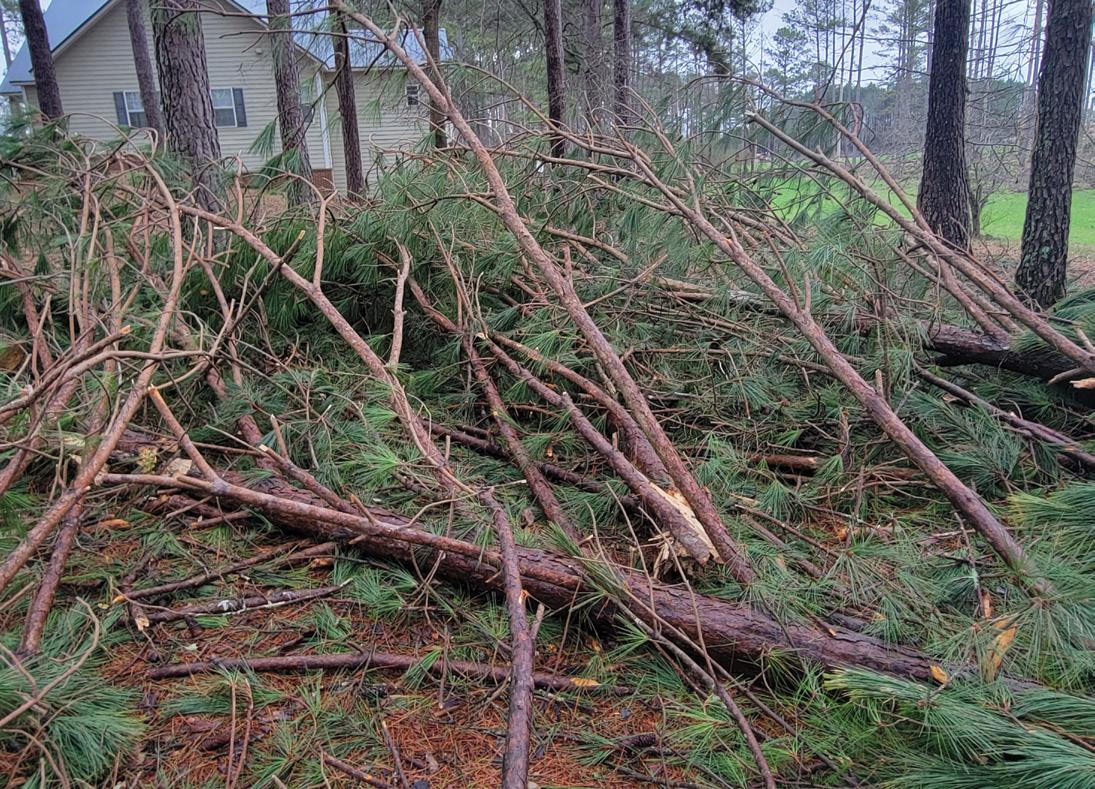

Garland said this is the third time this barn has lost roofing from strong winds since 1975.
“I’ve got tarps over my baler. All my tractors are in there,” Garland said. “It’s not just a building. There’s a lot of history in that building.”
There were reports of pastured poultry operations in Newton County that were damaged by the storms.
gfb.ag/FSAtornadoasst



The tornadoes ravaged parts of Butts, Cobb, Henry, Jasper, McDuffie, Meriwether, Newton, Pike, Spalding and Warren counties. Multiple private farms and the UGA Griffin campus sustained damage to agricultural assets.

One of the tornadoes in Griffin came close enough to the Spalding County Farm Bureau office to push its outside air conditioning unit off its pad and blow a few shingles from the roof. A stand of pine trees 100 feet away had numerous trees snapped off mid-trunk.
At the UGA Griffin Campus, multiple greenhouses and other farm buildings were damaged, and the campus lost numerous large trees. Several campus buildings were damaged by falling trees. The campus was closed for several days while cleanup work was being done.
On Andy Garland’s farm in south Henry County, an 80-foot by 40-foot barn lost about half of its tin roofing, leaving equipment exposed. The barn is a converted poultry house that the family uses to store equipment, work inside and have family gatherings.
Farmers love pocketknives. That’s why Heard County Farm Bureau (HCFB) arranged for Case XX, which has been making knives in Bradford, Pennsylvania, since 1889, to make a series of collector’s knives it sold to raise $10,000 for the Heard County FFA.
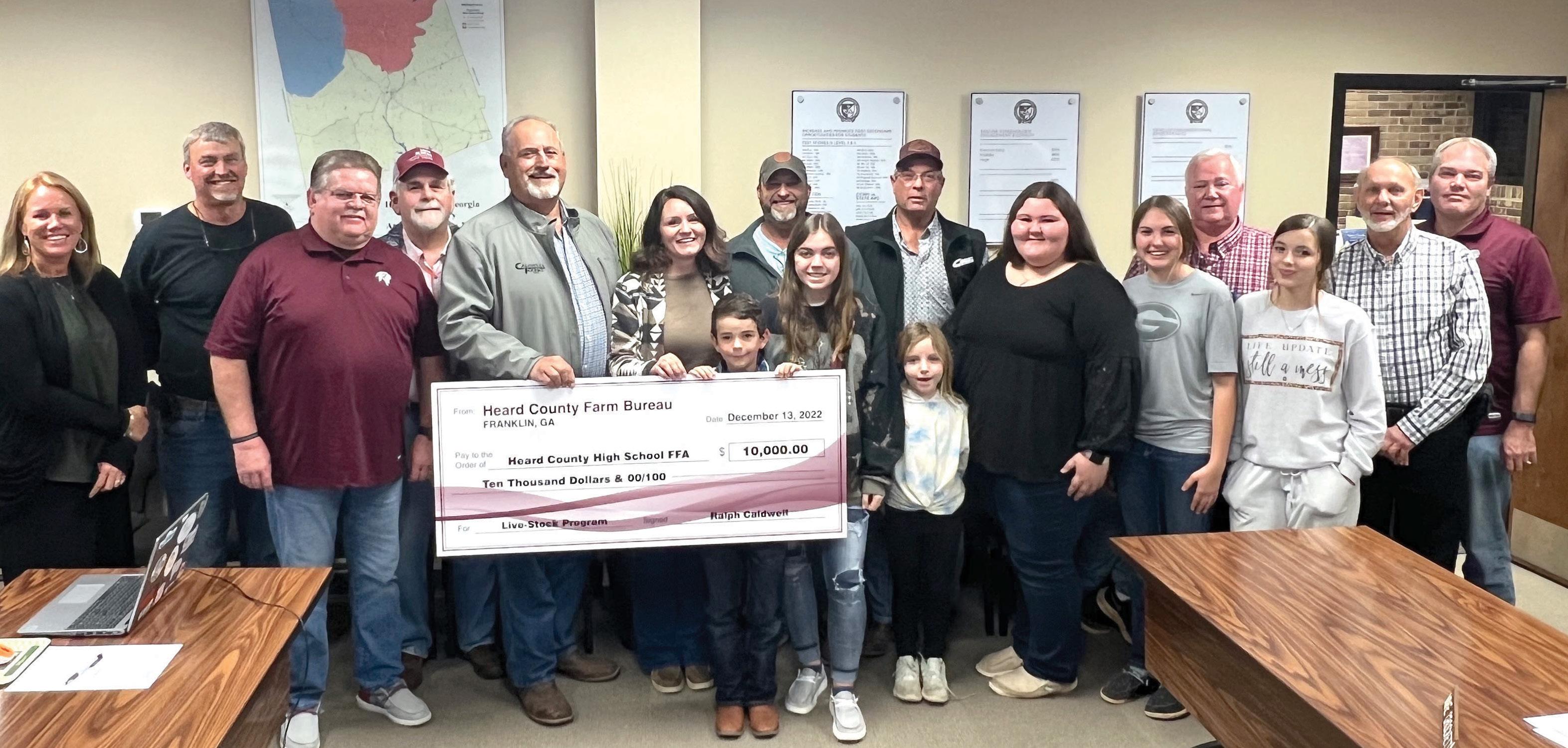
“Our FFA program started a show team a few years back, but they didn’t have a trailer. The Heard County School Board has ordered the FFA program a truck that it will share with the maintenance department, and I said our county Farm Bureau would help them with the trailer,” HCFB President Ralph Caldwell said.
HCFB had Case make 100 custom-designed Trapper knives featuring the FFA and Case logos on a blue bone handle. "Heard Co. FFA" and the knife number in the 100-piece series are engraved on the blade. Each knife sold for $100.
“The knives came in the first part of November and my goal was to have them sold by Christmas. Well, the community showed up and showed out. We sold them all in two weeks,” Caldwell said. “There’s a lot of former FFA members who collect pocketknives and want to support the local FFA program. This knife represents three American icons – FFA, Case knives and Farm Bureau. It doesn’t get much more American than that.”
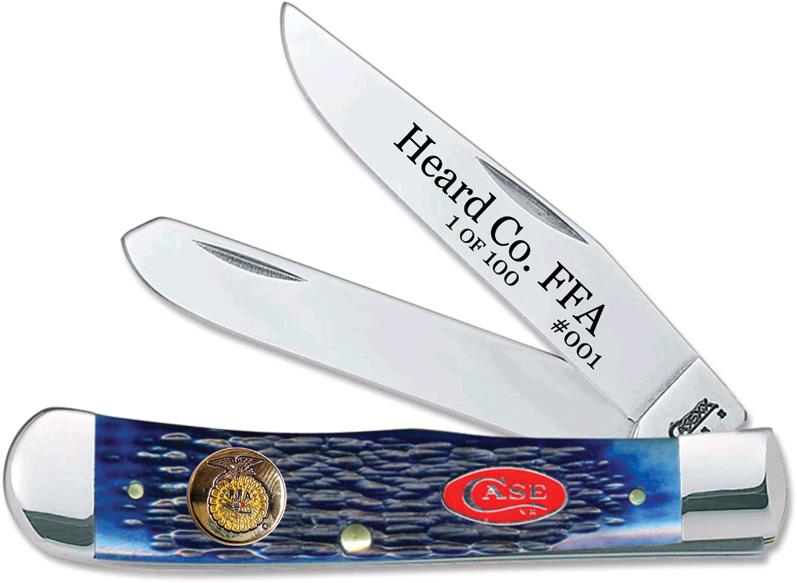
• Teachers interested in participating in the STEM challenge may visit www.gfb.ag/stemchallenge for more information & to register for the program.

• Top three grade winners will receive $350 in prizes for exploring vermiculture
• Participating classes will answer “How can I create a worm farm to better my garden?” 1.
1 Examining how worms help plants grow & thrive by improving soil health
2 Learning about the physical attributes of rocks & soils
3 Describing the benefits & importance of conservation & recycling natural resources
Horse enthusiasts can mount up and join the Kel-Mac Saddle Club at events it is hosting to raise money for charity. During its 47 years, Georgia’s oldest saddle club has raised more than $163,500 donated to: the Georgia Equine Rescue League, the Calvin Center’s Horses & Warriors, Sweet Olive Rescue, Madison Co. Mounted Drill Team, the Barbara R. Cummings Scholarship, the Morgan Co. Sheriff’s Empty Stocking Fund, and the equestrian facilities of state & county parks such as A. H. Stephens, Hard Labor Creek, Watson Mill Bridge and Heritage Park.
April 1 at 10 a.m. | ReDux Equine Rescue | Colbert
Riders can bring their horses to enjoy a trail ride and BBQ lunch at the ReDux Equine Rescue in Oglethorpe County located at 242 Mitchell Farm Rd., Colbert, 30628. Cost is $10 to ride the trails, $20 for ride & lunch or $10 for lunch only. All proceeds benefit the ReDux Equine Rescue. Rain date is April 15. Visit www. kelmac.com to register.
April 8, May 13, Sept. 9 & Oct. 7 | Morgan Co. Ag Center | Madison

These shows are open to equestrians of all ages and experience levels. Classes include hunter/jumper, western, gaited, trail obstacles, halter/showmanship, beginner, open, minis, & a costume contest at the Oct. 7 show. All shows begin at 9 a.m. - rain or shine. Entry fee per class is $10 and $12 for championship classes. General admission is free and concession food and drinks will be sold.
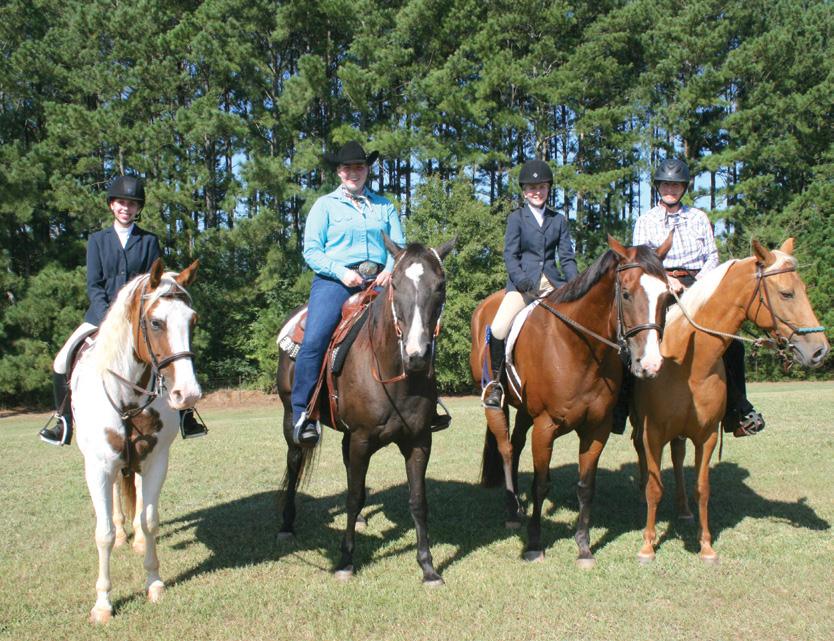
This will be an exciting year for participants in Georgia Farm Bureau’s Young Farmers and Ranchers (YF&R) Programs! YF&R opportunities are open to any Farm Bureau member ages 18-35 interested in agriculture.

In addition to longstanding events such as our YF&R Summer Leadership Conference, YF&R to Washington is back after a three-year hiatus due to COVID and will take place March 2831. This trip is typically a great recruitment tool to get members engaged and excited about GFB’s legislative work.
Additionally, GFB held its 2nd Annual Legislative Drive-In Feb. 13, in conjunction with GFB Day at the Capitol. This event prepared county volunteers serving on their Women’s Leadership and YF&R Committees to visit with their legislators by briefing them on current ag issues.
Registration information for the YF&R Summer Conference, to be held July 13-15 on Jekyll Island, and the annual YF&R Photo Contest will be released in early March. The application deadline
for awards and conference registration is June 1. Photo contest entries are due by June 9.
In early March, GFB will release information about all YF&R award programs – Achievement Award in Agriculture; Excellence in Agriculture Award; and Discussion Meet.
The achievement award recognizes YF&R members for their farming operations and leadership activities. The excellence in agriculture award honors YF&R members who earn the majority of their income off the farm but are vocal ag advocates. The discussion meet simulates a meeting where participants talk about current ag issues and explore possible solutions. These awards are pillars of the YF&R program and promote YF&R members across the state. Visit www.gfb.ag/yfr or contact your county Farm Bureau office for more information about the awards, photo contest and to register for the conference.
Colt Hart, Brian Fleming and Willie Sizemore represented Georgia in the three Young Farmers & Ranchers events held during the American Farm Bureau Federation convention in January.
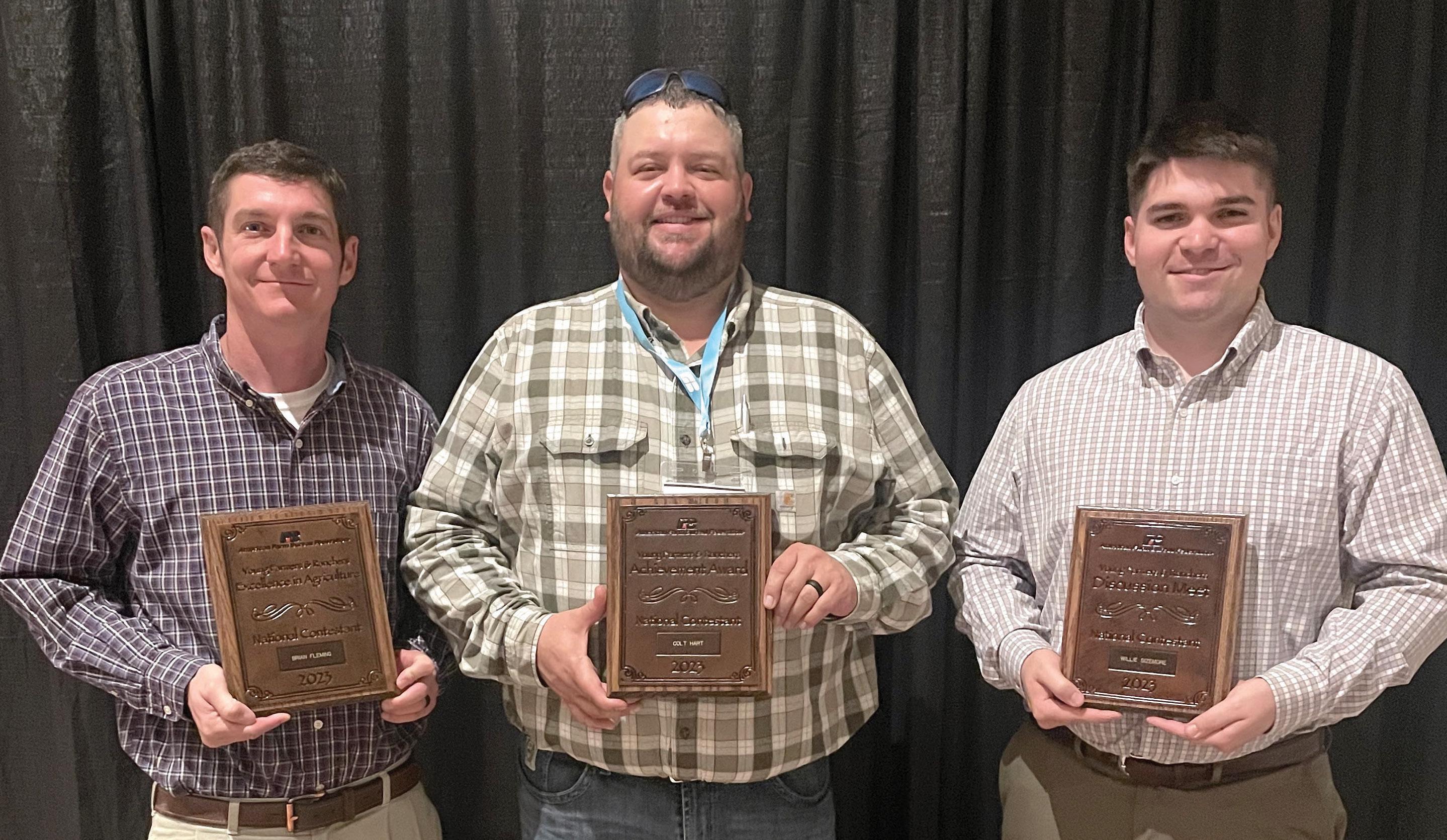
Lee County Farm Bureau member Willie Sizemore talked his way into the Sweet 16 round of the national YF&R Discussion Meet. This event is designed to simulate a committee meeting where participants talk about an ag-related issue and explore possible solutions. Contestants are evaluated on their ability to exchange ideas and information on a predetermined topic.
During his first round of competition Sizemore prevailed against competitors from Iowa, Minnesota, Nevada and South Carolina to advance. In the second round, he faced contestants from Maryland, Montana and Ohio to get to the third round, which pitted him against competitors from Idaho, Utah and Colorado. Sizemore faced eventual winner Mike Hannewald of Ohio in the second round.
Sizemore graduated from the University of Georgia in 2021 with a degree in agricultural communications and is currently a student at the Mercer University Law School.
Hart County Farm Bureau member Brian Fleming competed in the Excellence in Agriculture competition on Jan. 7, delivering a PowerPoint presentation outlining the advocacy work he does on behalf of agriculture.
This competition recognizes young farmers and ranchers for their agricultural advocacy efforts and leadership. Brian has chaired the Hart County Farm Bureau YF&R Committee since
2014 and grew the county’s YF&R program from just himself to its current membership of about 35. He served on the GFB YF&R Committee from 2019 to 2021 and regularly visits local schools to teach students about agriculture.
Fleming is operations manager for PTL Agriculture, the Fleming family farm owned by his dad, Bobby, that produces soybeans, wheat, oats, milo, corn, and hay on approximately 1,000 acres and maintains a small herd of brood cows. Brian also runs a small seed-cleaning operation that serves area farmers.
Franklin County Farm Bureau member Colt Hart represented Georgia in the AFBF Young Farmers & Ranchers Achievement Award competition. Colt is a fourth-generation farmer who raises cattle, broilers and goats with his wife, Leanna. The Harts also grow millet, ryegrass, Bermudagrass & wheat. The couple represents GFB's 2nd District on the GFB YF&R Committee. Colt is chairing the committee this year.
The achievement award recognizes young farmers and ranchers who have excelled in their farming or ranching operations and exhibited superior leadership abilities. Participants are evaluated on a combination of their agricultural operation’s growth and financial progress, Farm Bureau leadership and leadership outside of Farm Bureau.
The Georgia Farm Bureau Women’s Leadership Committee (WLC) had a successful 2022 full of new events. We’re excited about the future and strengthening programs for 2023!

Last year the WLC hosted district meetings for county WLC members in each of GFB’s 10 districts. At these events, attendees usually visited a farm, had an educational lesson and enjoyed a meal. Planning is underway for this year’s district meetings. Watch for announcements from your county offices and GFB district federation managers.
In November, the GFB WLC hosted its first Women in Ag Summit in Peachtree City to provide professional development to women in Georgia agriculture. The committee will host the 2023 Women in Ag Summit Nov. 2-3. Summit details for registration will be sent to county office managers and advertised when finalized.
At the 2022 GFB convention, the WLC held a “trade show bingo” to encourage GFB members to meet each other. Members got bingo cards at the WLC booth and then got members who had done things listed in the bingo squares to sign their cards. When they earned “bingo” they submitted their card at the booth and were entered in a drawing for a set of rocking chairs, fire pit or cooler.
“We hope activities like this encourage new and longtime members attending convention to network with fellow attendees,” said 2022 WLC Chair Melissa Mathis. “We hope they saw a familiar face or met someone new.”
Many thanks to the GFB members who represented Georgia at the Annual Meeting of the American Farm Bureau Women in January as part of the AFBF convention. GFB delegates were: 2023 WLC Chairman Kathy Sanders, Melissa Mathis, Donna Barrett, Connie Copelan, Doris Jean Malone and Lisa Rainwater. The women’s meeting allowed delegates to discuss ways to promote agriculture to consumers and students.
WLC partnered with the YF&R Committee to host the 2nd Annual Legislative Drive-In Feb. 13 to prepare WLC and YF&R participants to engage with state legislators during GFB Day at the Capitol.
In March, GFB WLC members will participate in the AFBF Fusion Conference in Jacksonville, Fla., and the National Ag in the Classroom Conference in Orlando, Fla., in June.
 By Jay Stone
By Jay Stone
With humorist Jane Jenkins Herlong providing entertainment and panelists offering tips for life and promoting agriculture, the inaugural Women in Ag Summit focused on enhancing the lives of female agriculturalists.

The Georgia Farm Bureau Women’s Leadership Committee hosted the event, held in Peachtree City last November, to celebrate the role women play in agriculture. Activities included a tour of Country Gardens Farm in Newnan and a networking reception.
Herlong, following the HER acronym – honor, evolve, rise –shared her journey from being a farmer’s daughter to appearing in the Miss America pageant. She discussed themes from her new book, Sweet Tea Secrets from the Deep-Fried South.
“You have to do life like you do tea,” Herlong said. “You have to be seasoned. You have to be steeped, and then you have to be steamed.”
The trick, she said, is to keep sight of the things that bring joy.
“The thing we have to be most careful of is not to lose sugar,” Herlong said. “I call that the humor in life. What makes you lose your humor? When you get stressed.”
In the session “The Art of the Side Hustle - Choosing the Best Yes," farmer Laura Jensen from Loganville, Wilcox
County ag teacher Addie Tucker, and Gordon State College Director of Career Services Dr. Tonya Moore gave tips for time and life management.
One key: Make room for your life's passions and prioritize involvements so you can pursue your passions.
Tucker, who serves as a foster parent and has two children of her own in addition to teaching ag, long wanted to raise pygmy goats. She realized goats didn’t fit her life, but she tried gardening and found her happy place.
“I realized I didn’t have time or resources for goats. The garden fits,” Tucker said. “You just learn what things work for your life and what doesn’t.”
Moore is also the Gordon State athletic director. When she isn’t working at the college, she and her husband, Ricky, run a marriage ministry, which she calls her ‘sweet spot,’ the thing she wants to devote time to outside of her job.
“My research shows that if you’re healthy at home, you’re also healthy at work,” Moore said. “What you’re doing at home spills over into the workplace. We try to help couples build a healthy legacy.”
In the “Ladies and Legislators,” session, state Reps. Patty Bentley (D-Butler) and Beth Camp (R-Concord) discussed how to communicate with elected officials.
The two legislators say emails, phone calls and texts are valuable, but should be done in your own words.
“Please do not send a form letter. Those form letters, we get tons of them, and it says the exact same thing,” Camp said. “You telling me why you’re for or against it and signing your name, has more impact than a rote message.”
Both representatives said face-to-face meetings are the most effective approach.
“I like to schedule appointments with constituents to talk face to face about the situation and come up with a resolution,” Bentley said.

The Georgia Foundation for Agriculture is developing a pipeline for Georgia’s next generation of farmers and agricultural leaders. Through early exposure to agriculture, classroom learning, higher education, farm-based mentorship and professional learning, our programs provide a structured path that fosters growth and sparks a passion in agriculture during one’s educational journey. In 2022, with new programs underway, GFA set out to deepen our work and improve our operations. Despite some challenges, we are proud of this year’s impact.
11,587 students taught in 63 counties 404 new teachers reached 168 boots-on-the-ground volunteers supported our work 24,948 miles driven across Georgia
400 ag books donated to public libraries
12 monthly ag ed newsletters sent to over 5,000 educators
149 elementary schools classes participated in GAE Stem Challenge which generated 22 media hits statewide
$65,000 worth of scholarships awarded
113 applications from 70 counties
4 award types
24 scholarship recipients
64 media articles about the scholarship program
• Raised $25,268.50 from 126 items listed on our Fall Online Auction (Cyber Monday opening)
• Hosted our first GFB Day at the Braves, sold 660 tickets and raised $20,226.81
4 months of statewide data collection for farmer mental health baseline study (Jan-April 2022)
1651 survey participants in 157 counties
40 key informant interviews
122 media articles about the study
10 regional presentations
3 national presentations
7 invited lectures/speaking sessions
FARMERS ARE IN CRISIS
42% of all farmers have thought about dying by suicide at least once in the past 12 months.
STRESS VARIES BY FARMING EXPERIENCE & ROLE
46% of first-generation farmers and 50% of farm managers think about dying by suicide at least once per month.
PEER NETWORKS ARE IMPORTANT
Nearly 60% of young farmers report stress about the lack of a role model.
31% of farmers report talking to friends or family as a coping mechanism and this coping mechanism serves as protective factor against suicidal ideation.
• Hosted our first Picnic on the Farm with over 300 attendees, and raised $59,133.04
• Raised $30,470+ in pledges and gifts through Georgia Farm Bureau Employee Giving
• Received over $12,000 from Magnolia Loom, a Georgia cotton t-shirt brand, through their give-back partnership
• Contracted with a grant-writing consultant to grow corporate and foundation donations
Financial support for the Georgia Foundation for Agriculture comes from donors such as you. Your gift to the Georgia Foundation for Agriculture helps ensure that programs such as the Georgia Ag Experience can continue to educate students and teachers across Georgia about the importance of agriculture. Invest in the next generation by giving the gift of agriculture today!
If you would like to make a donation, please visit www.gafoundationag.org/donate
If you prefer to pay by check, you may also download the donation form on our website and mail it in along with your generous gift. Your contribution is tax-deductible under IRS 170(b)(A)(VI) and 501(c)(3)and may be designated to support a specific purpose that is important to you or left unrestricted to be used where the need is greatest.
GFB looks forward to recognizing one of these teachers as the 2023 Georgia Ag in the Classroom Teacher of the Year.

Visit https://gfb.ag/massei22aitcteacher to learn how Kennedy Elementary teacher Monica Massei introduces her students to agriculture while meeting curriculum standards.
“I can teach every curriculum standard through agriculture. We read, solve math problems, learn history and create art,” said Massei, who teaches gifted resources to first and second graders.
Massei’s classes have adopted a cow through the Dairy Alliance’s Adopt a Cow program; planted and harvested vegetables in their school garden and learned about food nutrition and how to read food labels.
May 5 is deadline to submit applications. The winner receives a $500 cash award & a trip to the 2024 National Ag in the Classroom Conference.
This Georgia Farm Bureau (GFB) award recognizes a Georgia educator for his or her excellence in incorporating agriculture into their lessons while meeting Georgia curriculum standards. Agricultural concepts can support the teaching of science, technology, engineering, math (STEM); science, technology, engineering, art, math (STEAM) and science, technology, emotional learning, art, math (STREAM). Many Georgia teachers are integrating agriculture into their daily lessons. The GFB AITC Teacher of the Year award allows county Farm Bureaus to nominate a teacher who goes above and beyond to teach his or her students about Georgia agriculture.
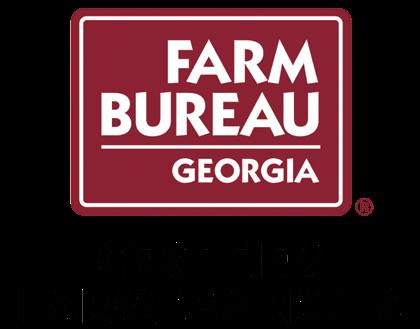
High school/middle school/elementary school ag teachers are not eligible for this award.
Teacher should have a close partnership with their local Farm Bureau.
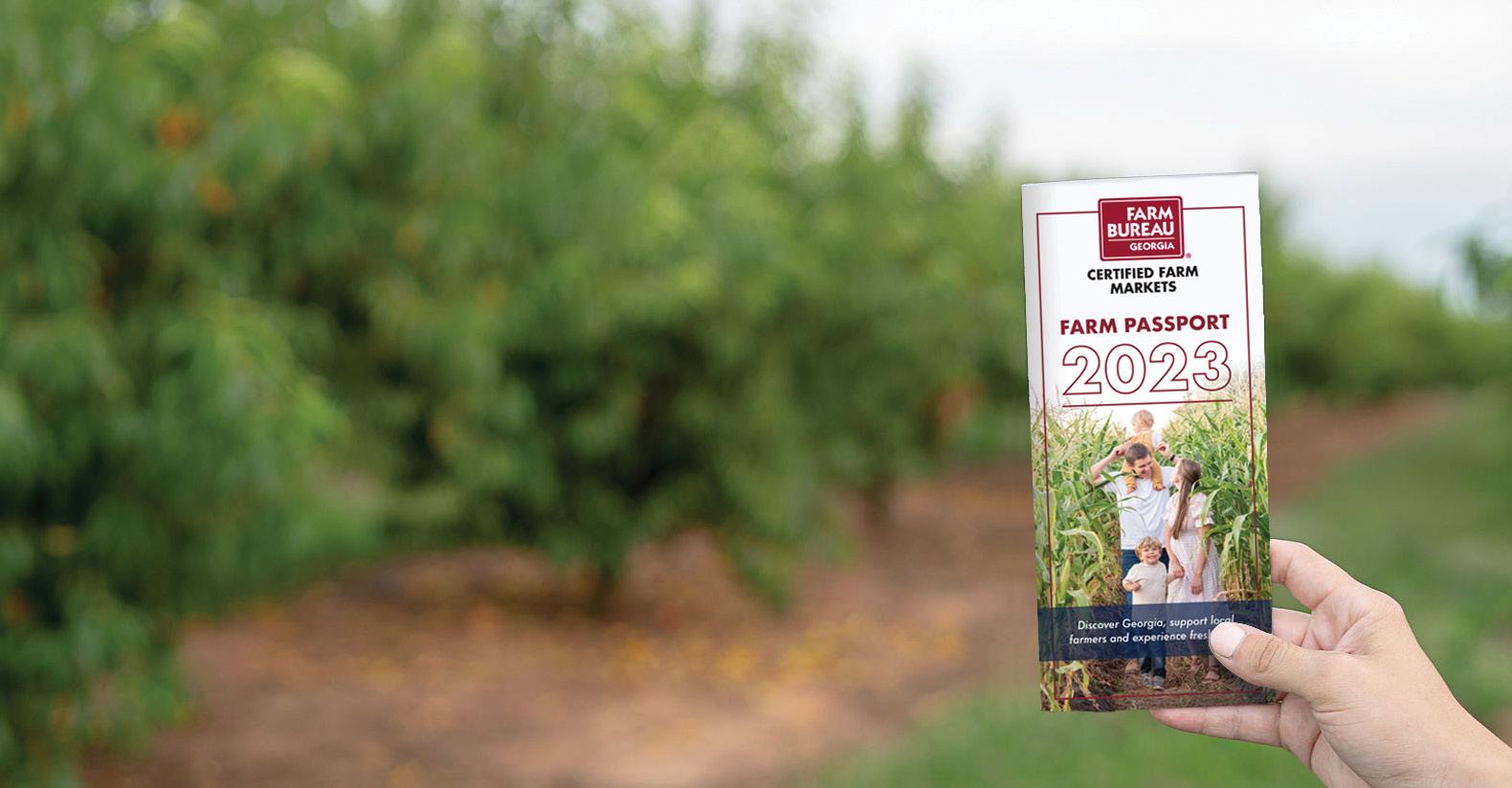
If interested in applying, contact your local Farm Bureau office. Visit www.gfb.ag/contact to find your county Farm Bureau’s contact information.
Applications must be submitted online. Visit www.gfb.ag/ teacheraward for more information & to apply.
Georgia Farm Bureau Educational Program Coordinator Lauren Gobl e may be reached at ldgoble@gfb.org or 478-474-0679, ext. 5135. Visit www.gfb.ag/AITC for the latest AITC news & fo r resources to teach children how their food is grown.
Georgia Farm Bureau (GFB) is proud to announce its 2023 GFB Federation Ambassadors.
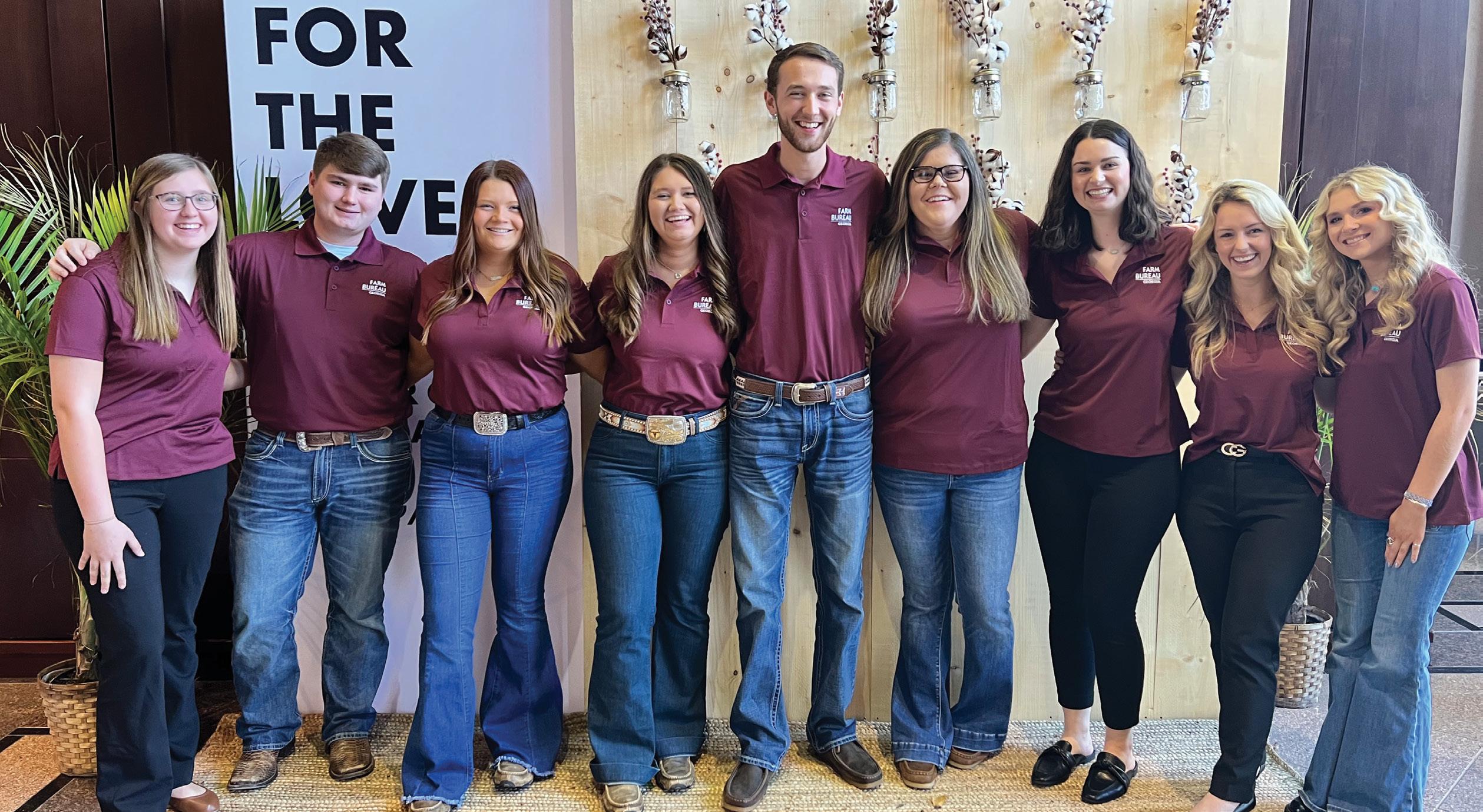
Due to their outstanding leadership during the inaugural program last year, Bailey Rayfield and Blake Segars will serve as chairmen of the 2023 team.
The GFB Federation Ambassadors will serve for one calendar year. Promoting GFB as a membership organization is the main purpose of the ambassador team.
The ambassadors will promote GFB through a variety of statewide member recruitment, public relations and brand awareness campaigns. Ambassadors will work alongside GFB staff and industry professionals on projects and events throughout Georgia. They are scheduled to attend about 25 ag events across Georgia this year to promote GFB.
“People want to hear from someone, other than a Farm Bureau employee, who is genuinely passionate about our organization,” explained GFB Membership Acquisition Manager Slayten Carter. “Think of our ambassadors as our nine walking billboards for Georgia Farm Bureau.”
While hosting the GFB booth during the six weekend days of the Georgia National Fair last October, GFB Ambassadors signed up 101 new members.
Rayfield and Segars shared tips on how the ambassador team recruits new members.
“Sincerely connect with the person you are talking to before asking them to join. Get to know them. Find out what they and you may have in common,” Rayfield said.
Segars recommends sharing GFB’s five values – faith, family, farming, flag (patriotism) and friends.
“Tell them who Georgia Farm Bureau is and what we stand for,” Segars said. “We believe that if you get out and talk to people about membership and what your Farm Bureau membership means to you, they will become a member.”
Federation Ambassadors are chosen based on their interpersonal skills, passion for ag advocacy, innovative thinking, and overall enthusiasm. To serve as an ambassador, candidates must be over the age of 18 at the time of selection, be willing to commit to the hours of service and present an exceptional application. If applicable, they must also maintain good academic standing while in service to the program.
Applications for the 2024 program will be available in November. To learn more, visit www.gfb.ag/ambassadors or follow @gafarmbureau on Instagram or gfb.org/group
Slayten Carter is GFB’s membership acquisition manager. She may be reached at smcarter@gfb.org .
